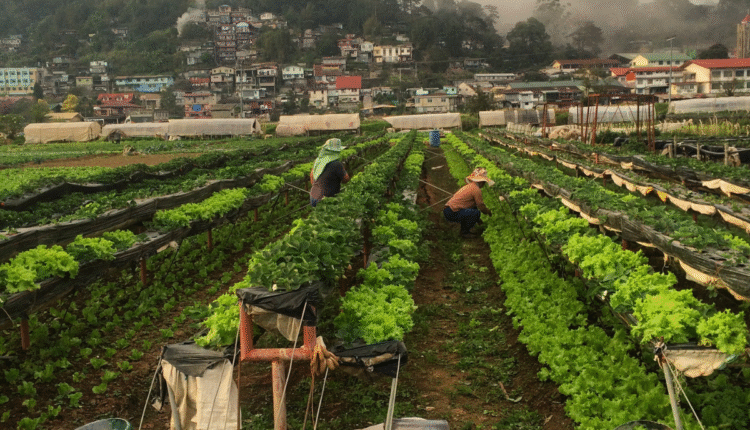Know how to do smart farming with natural farming from progressive farmer Manoj Kumar Singh of Lucknow
Natural farming India: Slowly, farmers are coming towards natural farming, although the number of such farmers is still limited, but seeing the smart methods of farming of Manoj Kumar Singh, a resident of Lucknow, young farmers will definitely want to adopt his model. Actually, progressive farmer Manoj Kumar cultivates many crops simultaneously instead of growing just one crop and that too in a completely natural way. He discussed in detail about his unique method of farming and natural farming with Kisan of India correspondent Sarvesh Bundeli.
When did it start?
Manoj Kumar has been doing farming since 1994, but in a chemical way. He says that production was good in chemical farming, but in 2019, one of his relatives, who also does natural farming, inspired Manoj Kumar for this farming and on his advice, he started organic farming. Manoj Kumar started organic farming with the seeds given by him and now he is also making seeds himself.
When he started natural farming in 2019, first of all he planted mahogany trees on the edge of the field and then dug a drain on the side so that urea and other chemicals from other’s fields do not flow into his fields. Then he planted mango, guava, amla and lemon trees in between so that the infestation of pests etc. is reduced.
Co-cropping with sugarcane
Manoj Kumar believes in co-cropping farming, away from the traditional method of farming, that is why he has planted more than one crop in each of his fields. He is doing natural farming in 3 acres. Which also includes a sugarcane field. Manoj tells that sugarcane is planted at a distance of 9 feet from row to row and paddy is planted in the space between.
He has planted Orissa paddy which gets ready in 60 days there, but in Barbanki it gets ready in 90 days. After paddy, he also plants lentils, urad etc. In this way, by the time sugarcane crop is ready, three more crops are obtained.
Vegetables with mustard
Apart from sugarcane, he has also planted many types of vegetables along with mustard in the mustard field. He tells that he has planted a vegetable called bakla along the edge of the mustard field, which gives seeds like peas, so first its green vegetable is made and then dal is made from its pods. And its gram flour is made and used in Jeevamrit.
Apart from this, kidney beans, coriander leaves and sweet peas are also grown in the mustard field and radish crop is planted on the boundary of the fields. The process of planting many crops together is called mixed cropping. Regarding this, Manoj Kumar says that all the crops complement each other. Some crops do the work of nitrogen fixing, while some need more nitrogen.
Vegetables with bananas
Manoj Kumar has also planted bananas along the edges of the field and in the middle area, last year he had planted chilli, brinjal, tomato, this time he has planted soya, fenugreek, spinach. He says that once a banana is planted, the tree dies after harvesting the fruit. In such a situation, the tree is cut into small pieces and put in a pit, which is used to prepare manure.
Bananas are also usually planted in November and the rainy season. He plants banana trees at a distance of 6-8 feet so that he can grow another crop in between. He has planted three varieties of bananas G9, China Banana and Gonda’s Sabzi Wala.
Tank for Jeevamrut
He has built a tank in the field itself to make Jeevamrut in which he puts excess cow dung, farm waste, rotten banana trees, and the remaining part of Jeevamrut. He has installed a portable spray pump for spraying Jeevamrut.
Potato cultivation
Manoj Kumar is cultivating vegetables like beans, gourd, pumpkin, bitter gourd, ridge gourd, ridge gourd, parwal. He has also planted potatoes in his field and the special thing about this is that he has sown gram along with potatoes for nitrogen fixing. He tells that after planting gram and potatoes, the crop was covered with straw so that the moisture does not decrease and there is no need for frequent irrigation. This also reduces the weeds or they do not grow at all. A thin drain has been made to drain out the water from the field. He has planted a famous variety of potato which is a local variety and gets ready after 90 days. (natural farming India)
Difference between chemical and natural
Manoj Kumar says that there is a huge difference between chemical and natural farming. There is a saying that the person who eats food will have the same taste. Humans fall sick by consuming chemical crops whereas natural crops keep the health healthy. Yes, the yield in natural farming is a little less, but eating these will not cause illness.
He says that his entire family eats only vegetables and grains grown naturally. He says that when he used to do chemical farming, he used to harvest 20 quintals of paddy in one bigha, but in the first year of natural farming, only 2 quintals of paddy were produced. But gradually the production starts increasing.
Some special varieties
Manoj Kumar has planted some special varieties of crops in his field, one of which is black rice. He says that people who take it from him once, ask for the same rice again and again. Apart from this, he also has varieties of Kathiya wheat, Chawal Katha, Paigabi or Sona Moti wheat. He says that he also provides wheat seeds and flour. Not only this, on the advice of the doctor, they prepare flour by mixing barley and gram in wheat, which is very nutritious.
How much is the profit?
Manoj Kumar says that if someone does organic farming properly, then he can earn 4-5 lakh rupees per acre. As far as he is concerned, he sells different crops at different prices. Like he extracts oil from mustard and sells it at the rate of 300 rupees per liter, he sells green vegetables at 60 rupees per kg, whatever the market price is.
The price of rice is different according to its variety, like Kala Namak rice is sold at 250 rupees per kg, Nan Chuniya Basa at 200 rupees per kg, Kalpana at 70 rupees, Jai Shri Ram at 100 rupees per kg. He says that his crop is completely natural and it has also got organic certificate. (natural farming India)
Manoj Kumar, who has won about 10 awards for natural farming, says that chemical farming will increase problems in the future and despite knowing this, people are doing it because it requires less effort compared to organic farming. Also, the market for natural farming is also a problem. Organic crops are a bit expensive. For this, the government needs to help the farmers as well as spread awareness among the people.
Contact details: If farmers want to share information or experiences related to farming with us, then they can do this by calling us on the phone number 9599273766 or by writing an email to [email protected] or by sending your recording. Through Kisan of India, we will convey your message to the people, because we believe that if the farmers are advanced then the country is happy.



